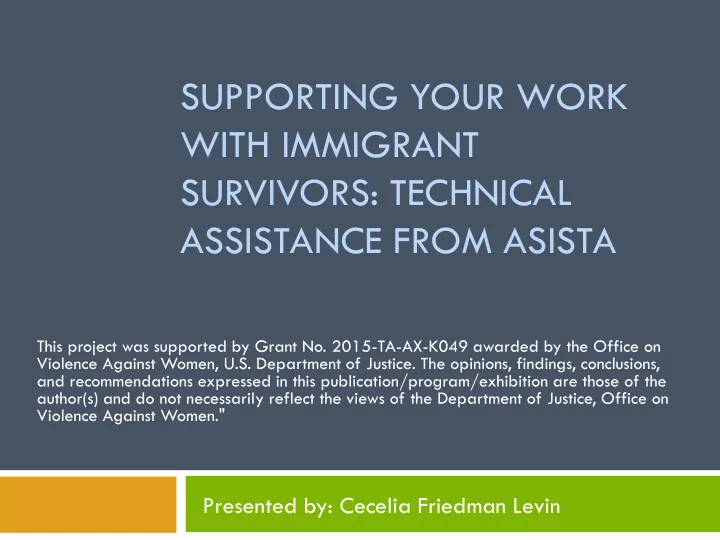

SUPPORTING YOUR WORK WITH IMMIGRANT SURVIVORS: TECHNICAL ASSISTANCE FROM ASISTA This project was supported by Grant No. 2015-TA-AX-K049 awarded by the Office on Violence Against Women, U.S. Department of Justice. The opinions, findings, conclusions, and recommendations expressed in this publication/program/exhibition are those of the author(s) and do not necessarily reflect the views of the Department of Justice, Office on Violence Against Women." Presented by: Cecelia Friedman Levin
Goals Describe ASISTA’s work Identify how ASISTA can help advocates and attorneys met the needs of immigrant survivors
ASISTA Trainings Resources Networks Individualized Liaison work case assistance
NIWAP Technical Assistance On: VAWA confidentiality protections Including issues that arise in family and criminal law cases Family law Protection orders, divorce, custody, child and spousal support Access to legal services Public benefits Housing, Education, TANF, Health Care, Driver’s Licenses, Language Access and Culture Immigration law VAWA, T visas, U-visas, SIJS, Detained Victims Criminal Investigations and Prosecutions: U & T visa certification by law enforcement, prosecutors, judges and building effective collaborations with victim advocates/attorneys
NIWAP Types of Technical Assistance Case consultations Training materials and practice tools Legal research, motions, briefs In-person trainings and webinars 24/7 web library and training videos Help developing policies/protocols Strategies for removing systemic barriers Community of Practice and Roundtables List serves
Hypo Talia is an immigrant woman from El Salvador who entered the United States without inspection in 2001. Her spouse is physically abusive to her and her minor children. She tells you that she tried to go to a local DV shelter, but the shelter staff is concerned they will get in trouble for harboring an undocumented immigrant. Talia is concerned about what will happen if she is arrested by immigration enforcement.
Talia tells you that she is married to a US citizen who has been physically abusive. She has called the police after an incident where her spouse was violent toward her and her 7 year old son and is willing to testify at the trial. She also says that she now works at her spouse’s buisness and hasn’t been paid. When she asked to get paid, her spouse said immigration would have her deported since she was working without permission.
DHS.GOV/BLUE-CAMPAIGN
Talia has a recent conviction for assault. After one time where her spouse tried to choke her, she scratched her spouse’s arms in self-defense. When the police came, they saw the scratches and arrested her. Talia has an prior removal order because she wasn’t aware she had a court date. Talia’s spouse told her to lie about her immigration status to get a job to help with the finances.
Talia decides to file for a VAWA self-petition. Her case is beyond processing times at the Vermont Service Center. You get an RFE in this case stating that she doesn’t have good moral character because of her criminal history Talia is arrested and detained by immigration enforcement agents before her VAWA case has been adjudicated.
How to reach us www.asistahelp.org Register your agency with ASISTA: http://bit.ly/ASISTARegistrationOVW Questions@asistahelp.org Cecelia Friedman Levin, cecelia@asistahelp.org
NIWAP Technical Assistance and Materials Call (202) 274-4457 E-mail niwap@wcl.american.edu Web Library: www.niwaplibrary.wcl.american.edu National Immigrant Women's Advocacy Project 12 American University Washington College of Law
Recommend
More recommend